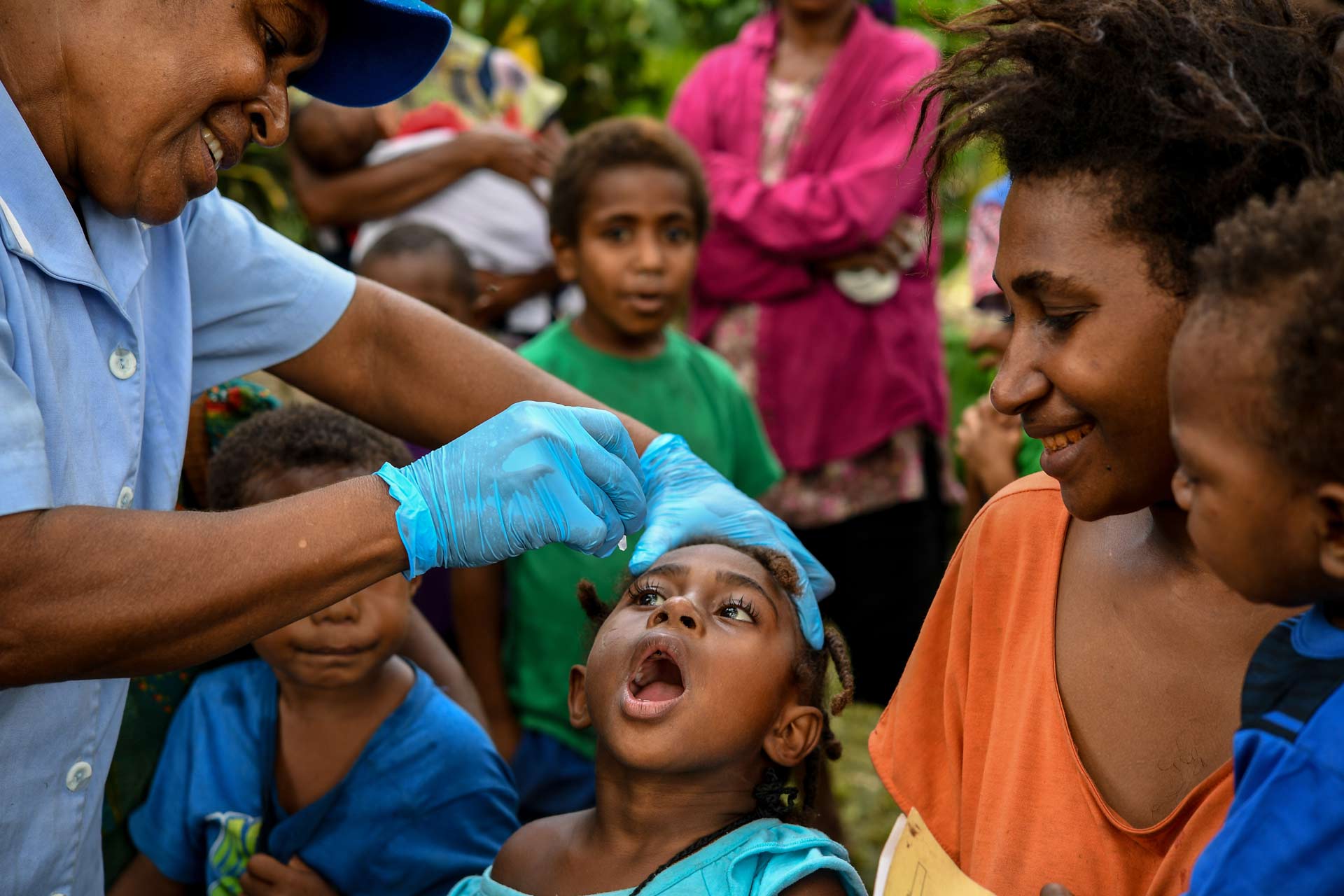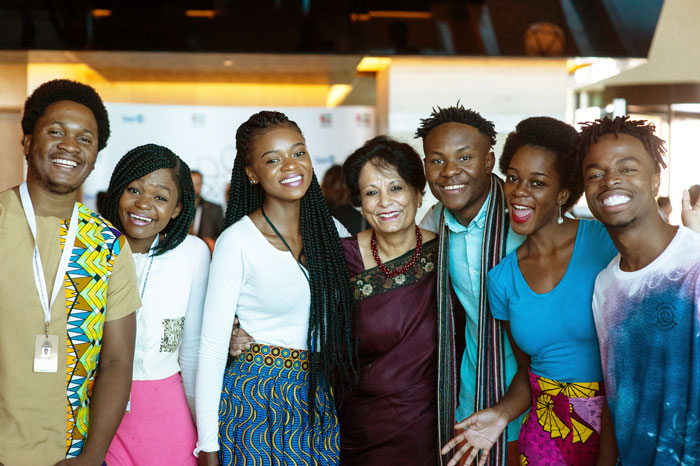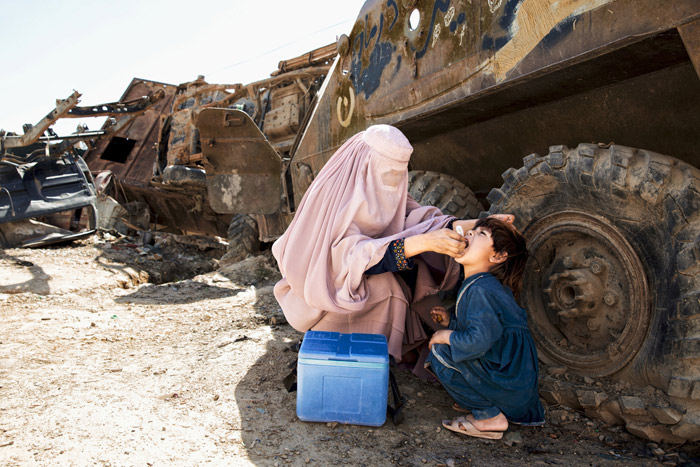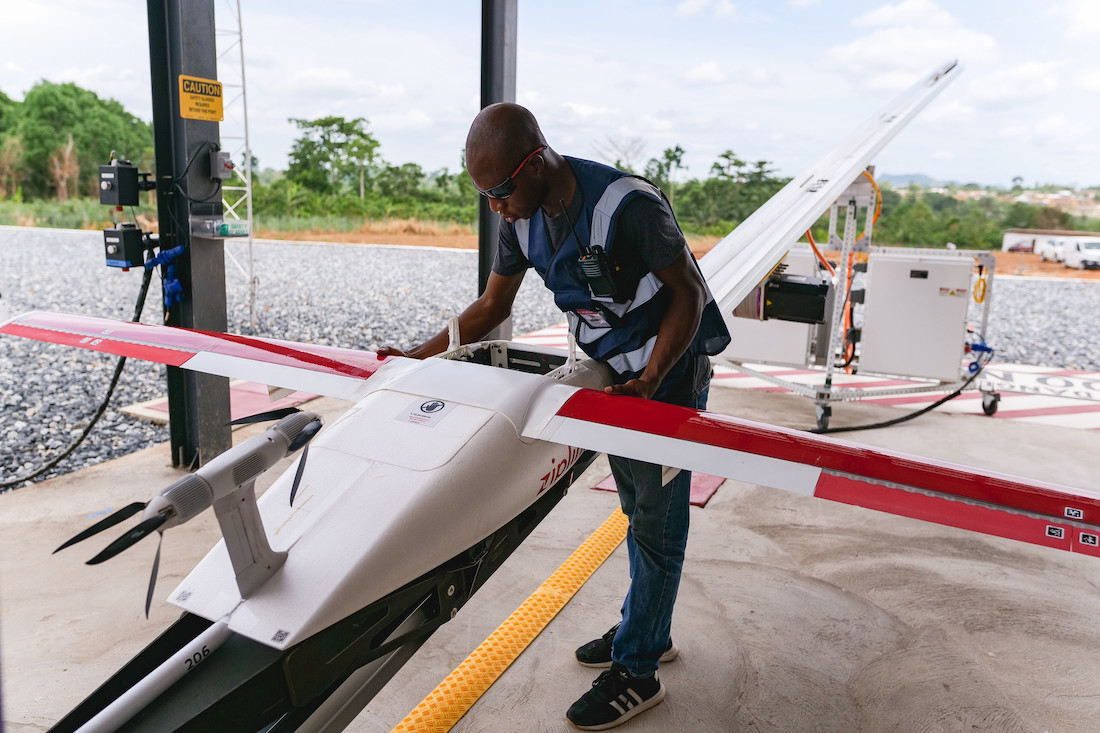Making sure that vaccines reach as many children as possible around the world requires a healthy dose of innovation. For World Immunization Week 2019, we are showcasing a series of innovations – from cutting-edge to low-tech – that further our mission to create equal access to new and underused vaccines for children living in the world’s poorest countries.
Drones delivering vaccines to hard-to-reach areas
Throughout the developing world, access to lifesaving and critical health products can be hampered by what is known as the last-mile problem: the challenge of quickly or efficiently delivering much-needed medical supplies from central distribution centres to remote or difficult to reach locations because of issues with transportation, communication or supply chain infrastructure.
Fast-forward to the future and the advent of autonomous drone technology, as a cost-effective, fast and reliable complement to existing supplies chains. In 2016, the Government of Rwanda became an early adopter when it launched the world’s first nationwide drone delivery service, using them to deliver blood supplies to medical facilities across the country. Since then, the service has expanded to cover almost the entire country, and now includes delivery of many other critical medical products. Ghana has since become the next adopter, with the planned launch in April 2019 of a drone delivery service for a range of medical products, including vaccines.
The drone fleet and launch sites are designed and run by the California-based robotics company Zipline, supported by a partnership with Gavi and UPS, the international package delivery and supply chain management company. By offering an “on-demand” service, additional vaccines can be sent quickly to health clinics to ensure that there are precisely the right number of doses available, depending on how many infants attend the vaccination session, ensuring that no one goes without.
Vaccines helping to prevent antimicrobial resistance
Antimicrobial resistance (AMR) has been hailed as one of the biggest threats to humanity. The number of deaths caused by drug-resistant bacteria is expected to rise from 700,000 to 10 million a year by 2050. But while the challenges of developing new classes of antibiotics and reducing the use and misuse of existing drugs have dominated the headlines, there is a more immediate and complementary solution: vaccines. Vaccination not only prevents the spread of these bugs and prevents resistance from occurring, but it can also significantly curtail the use of drugs every year by preventing infections in the first place.

Credit: Gavi/2018/AAPIMAGE-Brendan Esposito.
Blockchain technology optimising immunisation programmes
The journey of a vaccine from manufacture to protecting a child in every Gavi-supported country is a complex one. Every stage of the supply chain must be planned and coordinated, to ensure that vaccines stay safe and effective, and that they indeed reach the children who need them.
To address this, the German Federal Ministry for Economic Cooperation and Development (BMZ) through the KfW Development Bank in December 2018 announced a partnership with Gavi to explore the potential, feasibility and benefits of using blockchain technology to increase the efficiency of immunisation programmes.
Commencing in 2019, the joint project will focus on exploring practical areas of blockchain technology and how it can be used to support immunisation programmes, such as by tracking vaccines.
Music making #VaccinesWork
Through their music and weekly radio show, Zathu reaches out to millions of young Malawians, seeking to change the way young women are perceived and treated by their communities. Supported by Girl Effect, a Gavi partner, the band encourages discussion about topics affecting young people, from stereotypes and self-expression to relationships and sexual health.
While reversing centuries of social and cultural norms seems like an impossible task, Zathu and Girl Effect are already seeing results. In 2017, 96% of Malawians agreed that Zathu had taught them that girls should be treated equally to boys and 91% felt that the band had made them feel more in control of decisions that affected their lives. Moving forward, Gavi is hoping that Zathu can help generate demand for the newly introduced human papillomavirus (HPV) vaccine and reduce the high number of preventable cervical cancer deaths in Malawi.

Credit: Gavi/2018/Oscar Seykens.
Fridges powered by the sun
From DRC to Haiti, Gavi is helping countries to equip health centres with smart fridges powered by the sun. Besides keeping vaccines cool and safe, these fridges – often replacing antiquated or poorly functioning equipment – can cut fuel and maintenance costs. Also, by having geo-localisation functions, some are able to transmit their temperatures and locations to regional or national centres, enabling health workers to efficiently manage any problems that might occur. In August 2017, the first Gavi-supported fridge was installed in Kenscoff, above Port-au-Prince. By 2020, 721 solar-powered fridges will have been deployed in Haiti.
Meanwhile, in DRC, the Ministry of Health is set to boost the proportion of health facilities with working fridges from 16% in 2016 to 80% by the end of 2020. A bold target, but with help from Gavi’s Cold Chain Equipment Optimisation Programme there has already been remarkable progress. Ultimately, reinforcing the cold chain with solar-powered fridges will enable health workers to reach remote communities that are currently off the electricity grid, ensuring life-saving vaccines can reach everybody.
STEP programme
Getting vaccines to children in hard-to-reach areas is a challenging task. Cold-chain technology and infrastructure are essential, but a skilled and experienced workforce is equally important. However, leadership training in this critical area of immunisation has rarely received international support. That is until 2015, when Gavi partnered with logistics giant United Parcel Services (UPS) and the International Federation of Pharmaceutical Wholesalers (IFPW) to pioneer an innovative management training programme.
Introduced in countries across Africa and Asia, the Strategic Training Executive Programme (STEP) is an initiative helping immunisation supply chain managers to develop their skills through workshops and mentorships alongside experts from the private sector. By the end of 2020, Gavi expects that 600 supply chain leaders will have graduated from STEP programmes.The 175 STEP graduates from 23 countries have already helped to increase immunisation coverage in Gavi-supported countries.

Credit: Gavi/2009/Thomas Rippe.
International Finance Facility for Immunisation
At the cutting-edge of socially responsible investing for global health, the International Finance Facility for Immunisation (IFFIm) was created in 2006 to rapidly accelerate the availability and predictability of funds for Gavi's immunisation programmes. It was the first aid-financing entity in history to attract legally-binding commitments of up to 20 years from donors, allowing lower-income countries to make long-term budget and planning decisions about immunisation programmes.
IFFIm uses pledges from donor governments to sell bonds in the capital markets, making funds immediately available for Gavi to purchase and deliver life-saving vaccines and strengthen health services in the world's poorest countries.
Vaccine diplomacy
Today, millions of people live in countries suffering from armed conflict and violence. Because of security concerns and limited mobility in these areas, health workers often struggle to reach those in need with life-saving vaccines. As a result, immunisation coverage can drop, increasing the risk of vaccine-preventable diseases spreading. In 2007, on the International Day of Peace, UNICEF recognised these challenges and managed to negotiate a three-day ceasefire with warring parties in Afghanistan, during which they vaccinated 1.4 million children against polio. This use of immunisation as a peacebuilding innovation presents a hopeful basis upon which wider peace talks could be leveraged. Vaccines protect you from disease, regardless of which side you are on, and this is an incredible example of vaccine diplomacy.

Credit: UNICEF/UN0202762/Hibbert.

